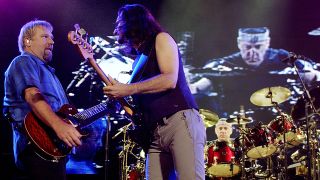The personal tragedies that befell Neil Peart in 1997 looked likely to end Rush’s career. He lost his daughter in a car crash; then, just 10 months later, he lost his wife to cancer. Knowing she’d died of a broken heart, the drummer took off on his bike. He wrote a song and a book about his travels; then, finally returned to the Rush fold with Geddy Lee and Alex Lifeson.
The result was 2002’s Vapor Trails – and while fans were delighted to welcome their heroes back, they were perhaps less delighted with the album. In 2010 guitarist Lifeson told Prog about the trio’s feelings on their work at the time.
“I’m not sure what kind of band we would have been if we hadn’t taken that time off. Who can tell? It was four years. but we certainly didn’t stop. I produced and did TV stuff – it was just that playing in Rush at that point wasn’t an option.
“Then, when we did reconvene for Vapor Trails, it became this most emotional and powerful record. We think very highly of that record, but there are things wrong with it. The way it sounds… it could have been better recorded. We would have done things in a different way. But I suppose we weren’t thinking straight – no, not that; it was just very raw, very visceral, you know?
We’ve talked about revising the sound – we’ve talked about it a lot. I guess enough time’s passed now
Alex Lifeson
“A lot of that stuff on there is first takes and demos, but because of what had happened and how we felt, we didn’t want to re-record. They felt too precious in a way. We were very protective of those songs at that time; we were all feeling very tender about it.
“Rich Chycki, my engineer, re-remixed One Little Victory and Earthshine for Retrospective III (2009) and they sounded just great. I’m not a big fan of those compilations, to be honest. They come and go; they’re contractual obligation things.
“But we’d all been feeling the same way about the sound of Vapor Trails. We’ve talked about revising the sound – we’ve talked about it a lot. I guess enough time’s passed now.
“I think we’re more curious than anything to see how it would sound. Now having heard what Rich has done with some of those songs too, it’s really made us think about it a lot more.”
On Ceiling Unlimited, Rush came across as an ill-disciplined bar band… now everything has its own space and suddenly a guitar solo appears
Prog
Rumors continued to circulate until Rush confirmed the release of an updated Vapor Trails in 2013, remixed and remastered by David Bottrill. That year Prog declared the results to be “deeply satisfying” and worth the long wait.
“We now get an album with more definition (How It Is, The Stars Look Down and Sweet Miracle all reveal greater detail and warmth), with noticeably less clipping or distortion on the guitars (listening to heavyweight opener One Little Victory ceases to be an endurance test) and greater dynamic contrast on almost every track – less noise and more room for the music to breathe.
“During the instrumental breaks towards the end of Ceiling Unlimited, Rush came across as an ill-disciplined bar band, raucously battling each other to be heard. Now everything has its own space and suddenly what sounds suspiciously like a guitar solo appears, hopelessly submerged or completely missing formerly, adding an extra welcome bonus.
“Taken on its own merits, and in the context with their back catalogue… Vapor Trails emerges as a more nuanced and, fittingly, more human album than Rush fans may remember.”

